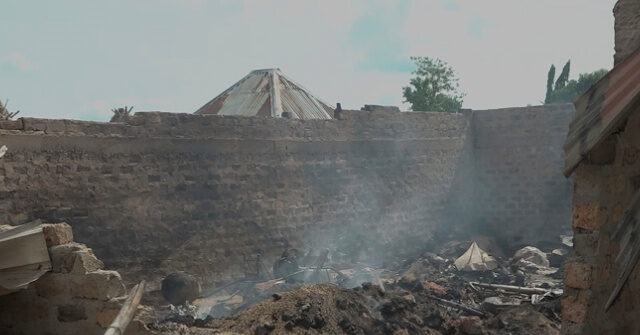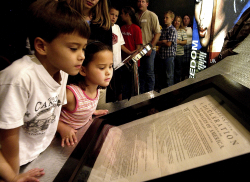Jihadi gunmen murdered at least a hundred Christians in the Nigerian village of Yelewata, central Nigeria, on Friday night, the latest in a long string of bloody attacks on farmers by the violent Fulani herdsmen.
Amnesty International (AI) Nigeria brought worldwide attention to the latest attack with a Saturday post on social media platform X, slamming the failure of Nigerian authorities to “stem the violence” and warning that “without immediate action, many more lives may be lost.”
“Many people are still missing, aside dozens injured and left without adequate medical care. Many families were locked up and burnt inside their bedrooms. So many bodies were burnt beyond recognition,” AI Nigeria wrote.
The group warned that “gunmen have been on a killing spree with utter impunity” in the state of Benue, causing “massive displacement” and setting the stage for “food security” issues as many farmers have been driven from their fields.
“The Nigerian authorities must immediately end the almost daily bloodshed in Benue state and bring the actual perpetrators to justice,” AI Nigeria demanded.
The office of the Benue state governor confirmed that an attack lasting at least two hours occurred on Friday night, and “a number of houses” were burned. Local police reportedly exchanged gunfire with the attackers.
The governor’s office estimated 45 deaths from the attack, but local residents agreed with AI Nigeria that the death toll was more than twice as high.
Rep. Rob Aderholt (R-AL) called the report from Benue “absolutely horrific” in an X post on Saturday night.
“Eyewitnesses confirm the killers shouted ‘Allahu Akbar’ during the assault. The world must not turn a blind eye to this violence against Christians,” Aderholt wrote.
International media organizations labored mightily to avoid telling their readers exactly who the victims and perpetrators were, variously describing the former merely as “farmers” or “villagers,” while the killers were identified as “gunmen” or “herders.” The BBC went with “armed cattle herders,” for example.
Reuters was honest enough to point out that Nigeria’s Benue state, where Yelewata is located, lies in “a region where the majority Muslim North meets the largely Christian South,” but readers were left on their own to deduce which side did the shooting on Friday night.
The perpetrators were members of the Fulani tribe, a predominantly Muslim group that has been trying to exterminate Christians in central Nigeria for years. The Fulani attacked Yelewata in October, killing at least six people and prompting Catholic priests to plead with the Western world for protection from the jihadis, since the Nigerian government showed little interest in stopping the murders and abductions.
“The Nigerian military are there, and even have a checkpoint at the entrance to the town, but they are compromised,” Father Moses Iorapuu, communications director for the Diocese of Makurdi, complained after the October attack.
Bishop Wilfred Anagbe of the Makrudi diocese gave testimony to the U.S. House Foreign Affairs Africa Subcommittee in March about the jihadi rampage in Benue, including attacks on his own home village. Anagbe described the Fulani herders as agents in a “campaign to take land to spread Islam.”
“The experience of the Nigerian Christians today can be summed up as that of a Church under Islamist extermination. It is frightening to live there!” he said, a sentiment the farmers of Yelewata would certainly agree with.
Pope Leo XIV prayed for the victims of the Nigerian massacre on Sunday, describing it as an act of “extreme cruelty.” He noted that many of the victims were refugees from other attacks who were staying at the Catholic mission in Yelewata.
“I pray that security, justice and peace will prevail in Nigeria, a beloved country afflicted by various forms of violence. And I pray in particular for the rural Christian communities of Benue State, who are incessant victims of violence,” the pope said.
Thousands of people protested in the Benue state capital of Makurdi on Sunday, enraged by the attack on Yelewata. Although the protest was described as peaceful by reporters, police dispersed it with tear gas.
“We are not abusing anyone, we are also not tampering with anybody’s property, we are discharging our rights to peacefully protest the unabated killings of our people, and now the police are shooting tear gas at us,” one of the protesters complained.
Nigerian President Bola Tinubu on Sunday said the news of “wanton killings in Benue State” was “very depressing.”
“We must not allow this bloodletting to continue unabated. Enough is now enough,” he said.
“I have directed the security agencies to act decisively and arrest perpetrators of these evil acts on all sides of the conflict and prosecute them,” he said. “Political and community leaders in Benue State must act responsibly and avoid inflammatory utterances that could further increase tensions and killings.”
Tinubu placed the burden of responsibility for restoring order upon Benue Gov. Hyacinth Alia, who said on Sunday he would “move very quickly to set up a five-man panel” to discover “who the culprits are, to know who the sponsors are, and to identify the victims, and to see how justice will be applied.”
“Tactical teams have begun arriving from the federal government and security reinforcements are being deployed in vulnerable areas,” he said.
The Ochetoha K’Idoma Forum, a group representing the Idoma tribe that heavily populates Benue, condemned the attack on Yelewata as “ethnic cleansing” and a “crime against humanity.”
The forum said the silence and passivity of the Nigerian federal government have emboldened the jihadis and warned they were planning attacks on many other communities in the region.
“We cannot continue to bury our loved ones while authorities issue empty statements and delay urgent interventions,” the forum said.


















